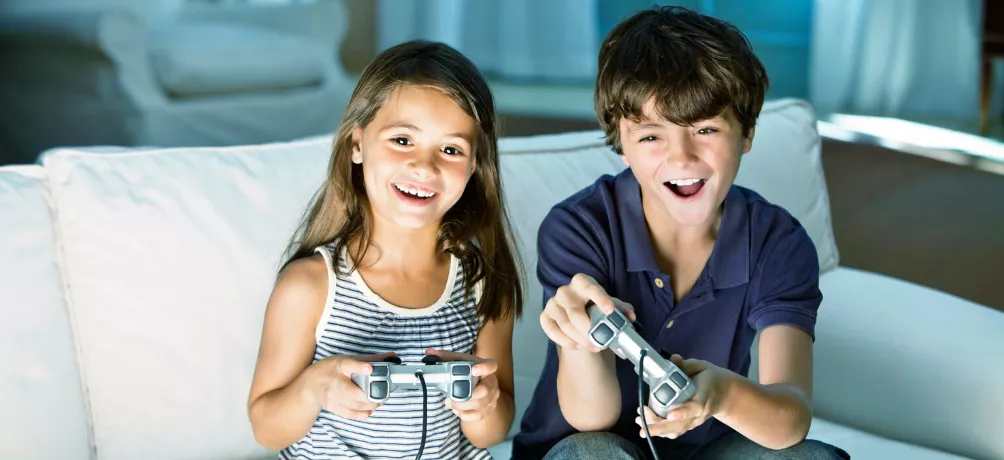Research Study Links Screen Time and Academic Performance in Children and Adolescents
By Dr. Mary Rooney, Ph.D.
As our use of electronic devices increases, researchers continue to study the potential effects of screen time on all areas of our lives, including our physical health, emotional well-being, and productivity. In children and teens, researchers are also looking at the impact on academic performance.
On average, children and teens watch television between 1.8 and 2.8 hours a day, play video games for 40 minutes, and use a computer for 34 minutes. Almost 30% of children and teens spend more than four hours per day of their free time using screens. When you consider that kids and teens have about eight hours of time each day that’s not spent sleeping or at school, then they are spending up to half of their free time each day looking at a screen!
A recent meta-analysis study published in JAMA Pediatrics1 analyzed the findings from 58 previous studies that looked at the connection between screen time and academic performance. Many of these prior studies showed negative associations between screen time and academic performance. For example, one found that adolescents who spent more than seven hours per day on screens were 40% less likely to achieve high academic performance.
In the current study, the researchers examined the overall connection between increases in screen time and academic performance. The findings show that as time spent watching television or playing video games increases, academic performance decreases. They also show that spending time on these activities may have a greater effect on academic performance for adolescents than children. Overall, the findings provide even more evidence of the need for limits around screen time in kids and teens.
Of course, not all screen time is bad. Using a computer for homework or a tablet to FaceTime with friends is much different from spending hours watching YouTube videos or playing video games. But too much time watching TV (or YouTube) and playing video games does seem to take a toll.
It’s probably not the content of the video or video game that is the problem. The negative impact is likely driven in part by what kids and teens are not doing when they are their screens: they are not being physically active, reading a book, playing music, or creating art – all factors that have been positively associated with stronger academic performance.
So far, researchers have not looked specifically at the connection between screen time and academic performance in kids with ADHD. But, since children and teens with ADHD have more academic challenges in general and need more physical activity to manage their symptoms, it’s possible that the connection between increased screen time and decreased academic performance is even more striking when ADHD is part of the picture.
While researchers continue to study and explore the reasons why screens seem to be taking a toll on our kids and teens, it’s important for parents to be aware of how much time everyone in the family is spending on their devices each day. Setting screen time limits in your home will not cause any harm, but there is a very good chance that it may help kids and teens be more successful at school and in other areas of their lives.
1Adelantado-Renau et al, (2019) Association Between Screen Media Use and Academic Performance Among Children and Adolescents. JAMA Pediatrics, epub.
ABOUT DR. MARY ROONEY
Mary Rooney, Ph.D., is a licensed clinical psychologist in the Department of Psychiatry at the University of California San Francisco. Dr Rooney is a researcher and clinician specializing in the evaluation and treatment of ADHD and co-occurring behavioral, anxiety, and mood disorders. A strong advocate for those with attention and behavior problems, Dr. Rooney is committed to developing and providing comprehensive, cutting edge treatments tailored to meet the unique needs of each child and adolescent. Dr. Rooney's clinical interventions and research avenues emphasize working closely with parents and teachers to create supportive, structured home and school environments that enable children and adolescents to reach their full potential. In addition, Dr. Rooney serves as a consultant and ADHD expert to Huntington Learning Centers.
ABOUT HUNTINGTON
Huntington Learning Center is the tutoring and test prep leader. Its certified tutors provide individualized instruction in reading, phonics, writing, study skills, elementary and middle school math, Algebra through Calculus, Chemistry, and other sciences. It preps for the SAT and ACT, as well as state and standardized exams. Huntington programs develop the skills, confidence, and motivation to help students of all levels succeed and meet the needs of Common Core State Standards. Founded in 1977, Huntington's mission is to give every student the best education possible. Call us today at 1.800.CAN LEARN to discuss how Huntington can help your child. For franchise opportunities please visit www.huntingtonfranchise.com.
This website does not provide medical advice, diagnosis, or treatment. The material on this site is provided for educational purposes only.


